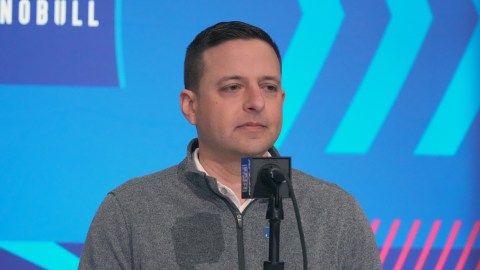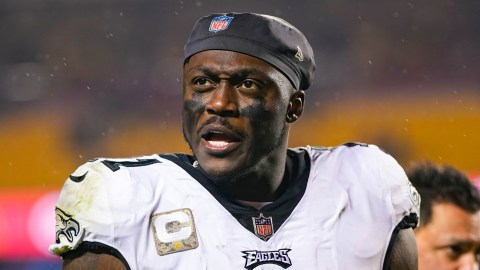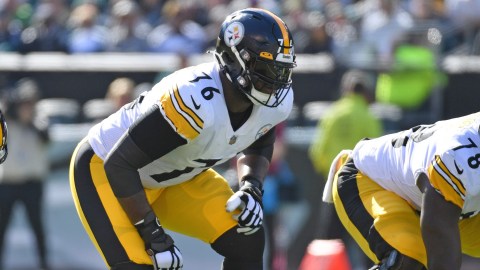 The Arizona Cardinals began the season 4-0. It was a feat marked by many an NFL scribe, as it should have been — such a record comes along in that southwestern state as often as a lunar eclipse.
The Arizona Cardinals began the season 4-0. It was a feat marked by many an NFL scribe, as it should have been — such a record comes along in that southwestern state as often as a lunar eclipse.
In New York and New England, the homes for last year’s Super Bowl participants, the early part of the season gets just as much attention, but usually in the opposite way. A loss is cause for hand-wringing. Two losses inspire worry. The Giants and Patriots, after all, are expected to win often and big each year.
It’s November now, though. As the air cools and teams enter the truly trying part of the season, few are worrying about the Giants and Patriots in the same way. Yes, there are questions of whether they will win, and analyzing of key matchups abounds.
But there’s already a certain finality as both teams lift their heads for the final stretch of the season. The Giants started this season scuffling, as they often do, with some really treacherous games. But some time of rest and a 38-10 blowout of the Packers on Sunday have made the Giants look more like the resilient, stacked team of years past — the team that knows how to peak when needed and put together a playoff run.
In the same way, New England’s demolition of the Jets on Thanksgiving was just as remarkable for its speed and definitiveness as it was for showing that the Patriots’ many problems seem to be quickly slipping away. In a matter of weeks, New England’s defense has suddenly turned itself into a turnover-forcing behemoth, and there’s hope that a bend-and-not-break defense has at last learned how to bend.
What’s interesting about these teams, who have both built their sustained success around a few stars and versatile cast of key players in recent years, is that they’re both dominating once the season moves to the second half — in exactly opposite ways. The Giants can be streaky, looking either unstoppably great or undeniably putrid. They’ve built their records in recent years off handfuls of victories in a row, mixed in with bad slides. But given a foothold in the playoffs in three of the last five seasons, they’ve won two Super Bowls.
The Patriots, on the other hand, have started a pattern of seeing their bigger plan for the season come together in the second half. The system and setup that coach Bill Belichick and friends put together doesn’t always click at the beginning of the year, but New England has been ruthless in late games over the past few years. The Patriots are 19-0 in games from Week 10 on since 2010. They are 36-6 in that same timeframe since 2007. When the weather gets cold, and the players settle in, a team built for the long haul does its best work, and New England is hard to beat — and increasingly Super Bowl-bound.
While both teams are markedly different in approach and execution, the template that is starting to form for how they play in the second half of their seasons (Patriots: consistently winning out; Giants: hiccupping until they rip off a playoff run) seems to be where both teams are headed again this season. In 2007, the Patriots’ not dropping a game for an eight-game stretch and the Giants triumphing through the playoffs seemed to be a one-time anomaly. But it happened again in 2011, and there’s reason to think it could repeat once more.
Consider the track record of the two teams over the past few years:
New England Patriots
- 2007: Well, this one doesn’t count for measuring late-season success versus early-season results, as New England went 16-0 on the year. But the Patriots did get four serious late-season tests that year that prepared the team better than the rest of its cupcake schedule: Philadelphia, Baltimore, Pittsburgh and the Giants. In the final weeks, New England fine-tuned what appeared to be a flawless approach.
- 2008: The Patriots just missed making the playoffs behind Matt Cassel but played well in the second half, closing the season with four straight wins.
- 2009: This year was a sign that poor second-half performances don’t bode well for the Patriots. After an uneven start to the year, New England came out of the bye at 5-2 and could never pick up second-half momentum. The Patriots continued their on-again, off-again style, and rather than the pieces coming together, the fragmenting defense and lack of offensive consistency sent the Patriots to a 5-4 second-half record. A 34-27 loss to the Texans in the final game of the season set up a horrid 33-14 torching by the Ravens in the first round of the playoffs.
- 2010: The Patriots had eight wins to end the season, including four 30-plus-point wins in the last five games of the year. New England was the best team in the AFC — until the Pats were stunned by the Jets in their first game in the playoffs. If not for that loss to the Jets, the Patriots most likely would have had an easy ride to Super Bowl glory that year.
- 2011: New England had enough plunges early in the season to concern the fan base, which never really trusted the team’s defense. But the Pats started winning in Week 10 and just kept going, capping each victory with another impressive outing. Eight wins later, and the Patriots were in the playoffs — and they thrashed the Broncos then eked past the Ravens to get to the Super Bowl.
- 2012: The Patriots are on a five-game winning streak, with every facet of the team’s game suddenly playing at a high level.
New York Giants
- 2007: The G-men ripped off six straight wins in the first part of the season but then stumbled down the stretch. They recovered come playoff time, though, winning four straight to take the Lombardi Trophy.
- 2008: A four-game win streak to start the season hit a bump against the Cleveland Browns before the Giants pulled off a seven-game winning streak to start the season 11-1. The Giants faltered at the end, with three losses in their final four games, and fell in the playoffs to the Eagles. It was the only time in the last five years that the Giants went to the playoffs but didn’t win the Super Bowl.
- 2009: The Giants won five games in a row to start the season then lost four, and they once again faded down the stretch, missing the playoffs.
- 2010: The Giants couldn’t do enough to distance themselves from their NFC East counterparts, and losses in two of their last three games kept them from the playoffs.
- 2011: The Giants lost four straight after starting the season 6-2 but won three of their last four to squeak into the playoffs yet again. What happened next was eerily like 2007.
- 2012: Off to another hot start, including a four-game win streak in October, the Giants came out of the bye week with a big win and are in the driver’s seat in the NFC East.
The Giants, who have become the masters of epic swings in momentum, have a rough final five games ahead against the Redskins, Saints, Falcons, Ravens and Eagles. But if history has shown anything, it’s that New York can lose a few down the stretch. As long as the Giants make the playoffs, craziness can happen.
New England, meanwhile, is right on track for another dominant end to the year. The Pats have won their last five games in a row, winning the last four by a margin of 190-81. While a team that some predicted would go undefeated this year has had its losses — three defeats by four total points, and all in games that were really decided by one or two plays — the Patriots’ success in recent weeks is more of a testament to where New England will stand when the year ends than early-season prognostications were. The Patriots have always looked good on paper, but their clunking through the early part of the season seems to have prepared the team just the right way for another second-half ascent.
So, what do you think? Is there a pattern, or just coincidence? Will the Giants go 2-3 and just make the playoffs, eventually advancing to face a Patriots team that sweeps the rest of the season and has all its pieces clicking come Super Bowl time?
The history seems to show it’s more probable than a 4-0 start for the Cardinals.



